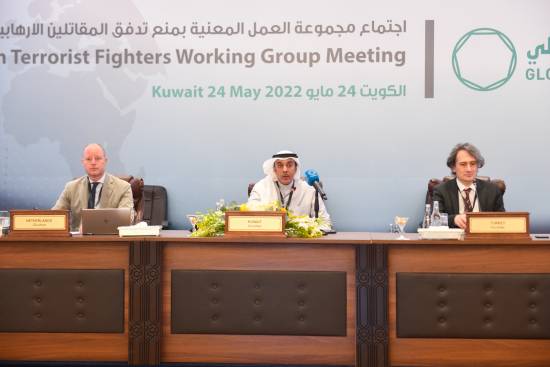The Foreign Terrorist Fighters (FTF) Working Group held a meeting on Tuesday in Kuwait to discuss and share insights on FTFs and the legal and administrative challenges, with a focus on issues around their prosecution and accountability. Hamad Al-Mashaan, Kuwaiti assistant foreign minister for international cooperation and development, stressed the country’s support for international efforts in reaching peace and combating terrorist groups during the opening ceremony.
The meeting is important to achieve peace in conflict areas by blocking all sources of terrorist threats, he said, adding that it aims to follow up on the joint and strategic efforts in confronting the damage resulting from FTFs, in addition to finding a clear mechanism for their return and integration into society.
Kuwait has made joint efforts with the international community in combating terrorism financing, in compliance with its effective role against the extremist Islamic State (IS) group, Mashaan noted, along with its pioneering role in facilitating the transfer of 186 members of fighters’ families in conflict areas and ensuring their access to their countries. The one-day meeting will also discuss all main challenges for the upcoming period and the importance of coordination and information exchange between members of the Global Coalition against Daesh (IS), he said.
“Despite positive developments, the international community is still going through difficult times due to the deteriorating conditions to which it is exposed at the hands of individual armed terrorist groups. It became important for the international community to implement the plans that were discussed during previous meetings to achieve the goals,” he noted.
Mashaan emphasized Kuwait’s position in supporting the FTF Working Group Meeting to help the international community achieve the desired goal of reaching comprehensive peace in conflict areas by stopping terrorism funding and combating the dangers of foreign terrorist fighters. “The aftermath and care for returnees from conflict areas is important. Through experience, psychological aspects must be taken into account, as well as providing financial assistance and finding social solutions to engage them in society,” he said.
“I hope there will be positive results in this meeting aimed at completing the work we have done during our previous meetings. I would like to confirm the commitment of Kuwait to Security Council resolutions no. 2178 and 2253 and its support for the countries of the international coalition to defeat IS,” Mashaan added. The FTF Working Group Meeting, headed by Kuwait, Turkey and the Netherlands, derives from the 85-member Global Coalition against Daesh, with the participation of several other countries and representatives from international and regional organizations, as well as civil society.


